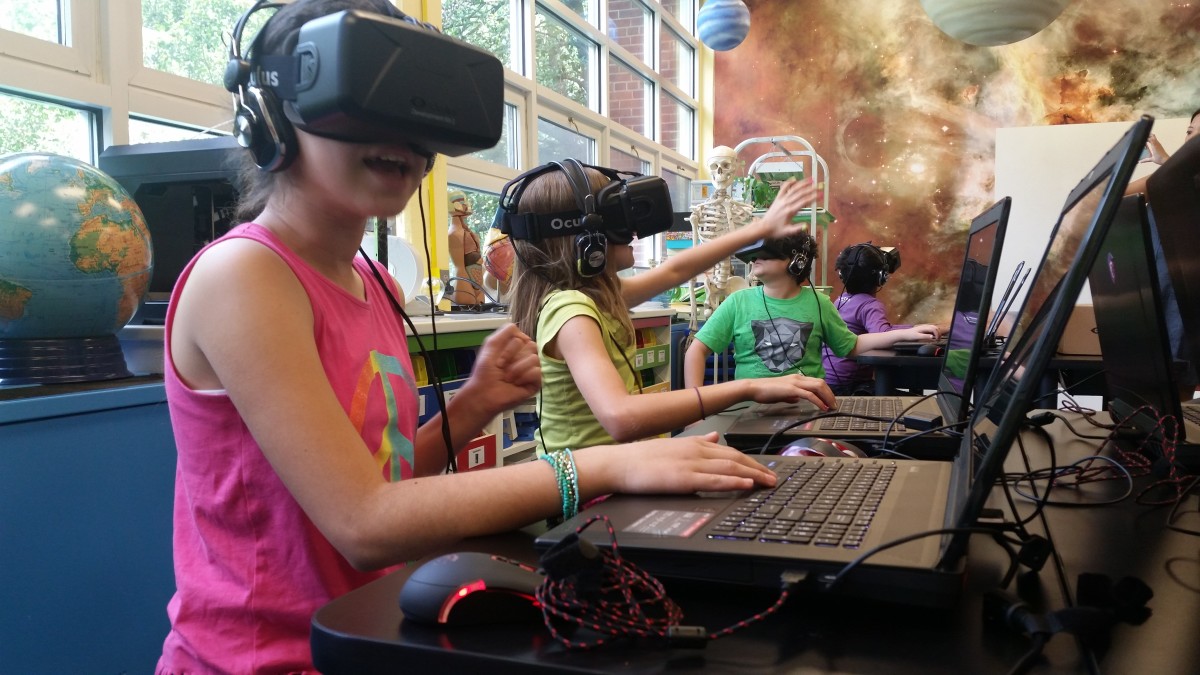We recently got a chance to float down the Amazon, and take some pictures of the wildlife along the way. There were gators swimming up to the side of the boat, and a jaguar emerged from the grass. There was a perilous trip over a waterfall at the end, but we survived.
The trip didn’t require a passport, and no more travel than a drive to West Baltimore. In fact, Alchemy Learning is looking to bring the trip to students from Baltimore, D.C. and beyond in the coming months.
The Baltimore edtech startup is working on a platform for using virtual reality in the classroom. As a result of a partnership with the International Neuroscience Network Foundation, the five-person team is looking to build out a virtual reality platform for K-12 education using Oculus Rift, and hoping to empower others to do the same.
Cofounders Henry Blue and Win Smith realize that mere mention of virtual reality conjures images of the hulking headsets and corresponding pods that appeared at your favorite arcade in the ’90s.
With the Oculus Rift headset, however, virtual reality has gotten a lot cheaper ($250).
“With the news of the consumerization of it where every major tech company has announced some form of virtual reality, we were trying to get ahead of the curve,” Smith said.
And technology has caught up to the point where some of the tools are already familiar. For instance, Alchemy used Unity Game Engine to build the Amazon journey, a tool that’s very familiar to many game developers, said Alchemy technical lead Jonathan Wilson.
Take the Amazon game, which is Alchemy’s prototype classroom VR experience.
After kids take pictures of the wildlife in the game, they envision text able to appear on the screen that will provide a brief lesson about what animals they saw. The part of VR that tricks the brain into thinking they’re inside the world of the headset only makes that interaction more real.
To date, Alchemy’s main product has been a cloud-based curriculum that allows organizations to create lessons for distribution. They see opportunities to integrate VR into the platform, which already offers pre- and post-lessons for field trips.
“Our goal is to have a platform that really helps teachers use this as an educational tool,” Blue said.
While the Alchemy team is more than convinced in the promise of VR in the classroom, they realize that teachers may be slower to adapt. To change minds, they have one goal: Put it on them.
The startup is partnering with education programs in Baltimore City like Living Classrooms and the Baltimore Curriculum Project to get the device out there, and is also working in D.C. and Alexandria, Va. Alchemy has about six headsets, and is assembling kits that include laptops to get students trying it on. It’s as much of a chance for the students to try out the experience as the teachers. Even though they don’t read TechCrunch every hour for the latest trends, teachers can still see the opportunity VR presents.
They also want teachers to have a chance to learn about all the VR experiences that are out there, so they’re keeping the platform open.
Before you go...
Please consider supporting Technical.ly to keep our independent journalism strong. Unlike most business-focused media outlets, we don’t have a paywall. Instead, we count on your personal and organizational support.
Join our growing Slack community
Join 5,000 tech professionals and entrepreneurs in our community Slack today!

Entrepreneurship is changing, and so is the economic development behind it

Tech Hubs’ new $210M funding leaves Baltimore and Philly off the table

Here’s what to know before using AI to craft your brand’s social media posts



